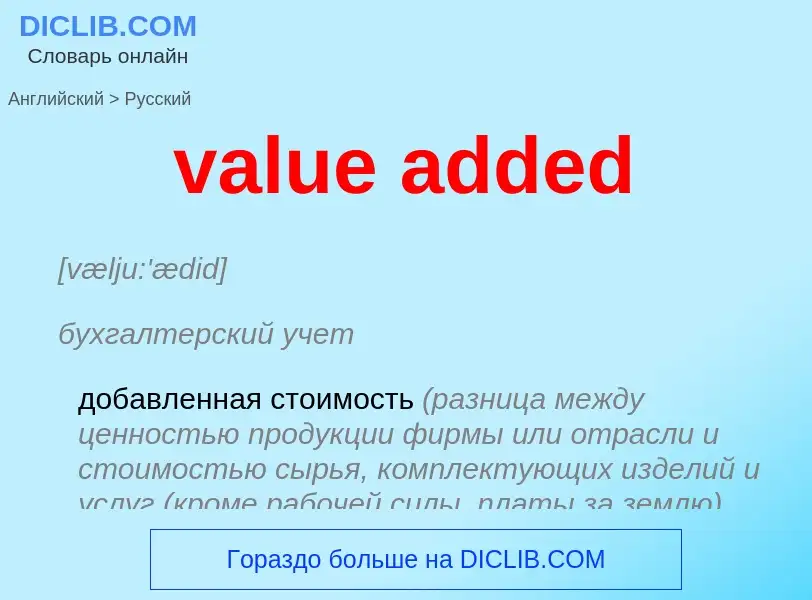Μετάφραση και ανάλυση λέξεων από την τεχνητή νοημοσύνη ChatGPT
Σε αυτήν τη σελίδα μπορείτε να λάβετε μια λεπτομερή ανάλυση μιας λέξης ή μιας φράσης, η οποία δημιουργήθηκε χρησιμοποιώντας το ChatGPT, την καλύτερη τεχνολογία τεχνητής νοημοσύνης μέχρι σήμερα:
- πώς χρησιμοποιείται η λέξη
- συχνότητα χρήσης
- χρησιμοποιείται πιο συχνά στον προφορικό ή γραπτό λόγο
- επιλογές μετάφρασης λέξεων
- παραδείγματα χρήσης (πολλές φράσεις με μετάφραση)
- ετυμολογία
value added - translation to Αγγλικά
[vælju:'ædid]
бухгалтерский учет
добавленная стоимость (разница между ценностью продукции фирмы или отрасли и стоимостью сырья, комплектующих изделий и услуг (кроме рабочей силы, платы за землю), приобретаемых для обеспечения выпуска этой продукции)
статистика
условно-чистая продукция
экономика
стоимость
добавленная обработкой
условно чистая продукция
синоним
бухгалтерский учет
создание добавленной стоимости (деятельность по улучшению продукта или услуги или по повышению стоимости продукта или услуги, за которую покупатель готов заплатить)
Смотрите также
Ορισμός
Βικιπαίδεια
Value added is a term in financial economics for calculating the difference between market value of a product or service, and the sum value of its constituents. It is relatively expressed to the supply-demand curve for specific units of sale. It represents a market equilibrium view of production economics and financial analysis. Value added is distinguished from the accounting term added value which measures only the financial profits earned upon transformational processes for specific items of sale that are available on the market.
In business, total value added is calculated by tabulating the unit value added (measured by summing unit profit — the difference between sale price and production cost, unit depreciation cost, and unit labor cost) per each unit sold. Thus, total value added is equivalent to revenue minus intermediate consumption. Value added is a higher portion of revenue for integrated companies (e.g. manufacturing companies) and a lower portion of revenue for less integrated companies (e.g. retail companies); total value added is very nearly approximated by compensation of employees, which represents a return to labor, plus earnings before taxes, representative of a return to capital.

